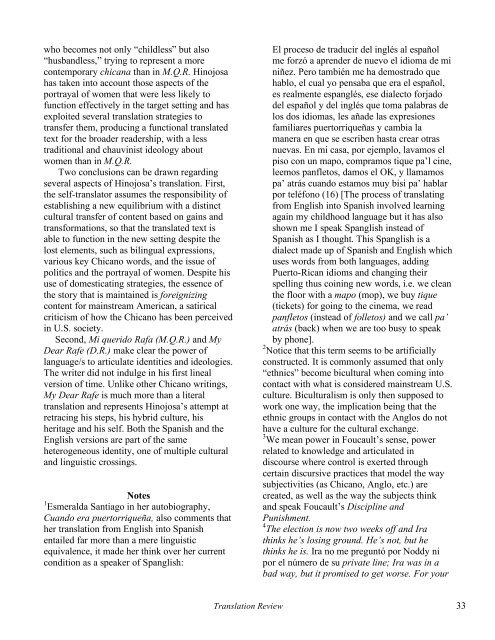Translation Review - The University of Texas at Dallas
Translation Review - The University of Texas at Dallas
Translation Review - The University of Texas at Dallas
You also want an ePaper? Increase the reach of your titles
YUMPU automatically turns print PDFs into web optimized ePapers that Google loves.
who becomes not only “childless” but also<br />
“husbandless,” trying to represent a more<br />
contemporary chicana than in M.Q.R. Hinojosa<br />
has taken into account those aspects <strong>of</strong> the<br />
portrayal <strong>of</strong> women th<strong>at</strong> were less likely to<br />
function effectively in the target setting and has<br />
exploited several transl<strong>at</strong>ion str<strong>at</strong>egies to<br />
transfer them, producing a functional transl<strong>at</strong>ed<br />
text for the broader readership, with a less<br />
traditional and chauvinist ideology about<br />
women than in M.Q.R.<br />
Two conclusions can be drawn regarding<br />
several aspects <strong>of</strong> Hinojosa’s transl<strong>at</strong>ion. First,<br />
the self-transl<strong>at</strong>or assumes the responsibility <strong>of</strong><br />
establishing a new equilibrium with a distinct<br />
cultural transfer <strong>of</strong> content based on gains and<br />
transform<strong>at</strong>ions, so th<strong>at</strong> the transl<strong>at</strong>ed text is<br />
able to function in the new setting despite the<br />
lost elements, such as bilingual expressions,<br />
various key Chicano words, and the issue <strong>of</strong><br />
politics and the portrayal <strong>of</strong> women. Despite his<br />
use <strong>of</strong> domestic<strong>at</strong>ing str<strong>at</strong>egies, the essence <strong>of</strong><br />
the story th<strong>at</strong> is maintained is foreignizing<br />
content for mainstream American, a s<strong>at</strong>irical<br />
criticism <strong>of</strong> how the Chicano has been perceived<br />
in U.S. society.<br />
Second, Mi querido Rafa (M.Q.R.) and My<br />
Dear Rafe (D.R.) make clear the power <strong>of</strong><br />
language/s to articul<strong>at</strong>e identities and ideologies.<br />
<strong>The</strong> writer did not indulge in his first lineal<br />
version <strong>of</strong> time. Unlike other Chicano writings,<br />
My Dear Rafe is much more than a literal<br />
transl<strong>at</strong>ion and represents Hinojosa’s <strong>at</strong>tempt <strong>at</strong><br />
retracing his steps, his hybrid culture, his<br />
heritage and his self. Both the Spanish and the<br />
English versions are part <strong>of</strong> the same<br />
heterogeneous identity, one <strong>of</strong> multiple cultural<br />
and linguistic crossings.<br />
Notes<br />
1 Esmeralda Santiago in her autobiography,<br />
Cuando era puertorriqueña, also comments th<strong>at</strong><br />
her transl<strong>at</strong>ion from English into Spanish<br />
entailed far more than a mere linguistic<br />
equivalence, it made her think over her current<br />
condition as a speaker <strong>of</strong> Spanglish:<br />
El proceso de traducir del inglés al español<br />
me forzó a aprender de nuevo el idioma de mi<br />
niñez. Pero también me ha demostrado que<br />
hablo, el cual yo pensaba que era el español,<br />
es realmente espanglés, ese dialecto forjado<br />
del español y del inglés que toma palabras de<br />
los dos idiomas, les añade las expresiones<br />
familiares puertorriqueñas y cambia la<br />
manera en que se escriben hasta crear otras<br />
nuevas. En mi casa, por ejemplo, lavamos el<br />
piso con un mapo, compramos tique pa’l cine,<br />
leemos panfletos, damos el OK, y llamamos<br />
pa’ <strong>at</strong>rás cuando estamos muy bisi pa’ hablar<br />
por teléfono (16) [<strong>The</strong> process <strong>of</strong> transl<strong>at</strong>ing<br />
from English into Spanish involved learning<br />
again my childhood language but it has also<br />
shown me I speak Spanglish instead <strong>of</strong><br />
Spanish as I thought. This Spanglish is a<br />
dialect made up <strong>of</strong> Spanish and English which<br />
uses words from both languages, adding<br />
Puerto-Rican idioms and changing their<br />
spelling thus coining new words, i.e. we clean<br />
the floor with a mapo (mop), we buy tique<br />
(tickets) for going to the cinema, we read<br />
panfletos (instead <strong>of</strong> folletos) and we call pa’<br />
<strong>at</strong>rás (back) when we are too busy to speak<br />
by phone].<br />
2 Notice th<strong>at</strong> this term seems to be artificially<br />
constructed. It is commonly assumed th<strong>at</strong> only<br />
“ethnics” become bicultural when coming into<br />
contact with wh<strong>at</strong> is considered mainstream U.S.<br />
culture. Biculturalism is only then supposed to<br />
work one way, the implic<strong>at</strong>ion being th<strong>at</strong> the<br />
ethnic groups in contact with the Anglos do not<br />
have a culture for the cultural exchange.<br />
3 We mean power in Foucault’s sense, power<br />
rel<strong>at</strong>ed to knowledge and articul<strong>at</strong>ed in<br />
discourse where control is exerted through<br />
certain discursive practices th<strong>at</strong> model the way<br />
subjectivities (as Chicano, Anglo, etc.) are<br />
cre<strong>at</strong>ed, as well as the way the subjects think<br />
and speak Foucault’s Discipline and<br />
Punishment.<br />
4 <strong>The</strong> election is now two weeks <strong>of</strong>f and Ira<br />
thinks he’s losing ground. He’s not, but he<br />
thinks he is. Ira no me preguntó por Noddy ni<br />
por el número de su priv<strong>at</strong>e line; Ira was in a<br />
bad way, but it promised to get worse. For your<br />
<strong>Transl<strong>at</strong>ion</strong> <strong>Review</strong> 33

















